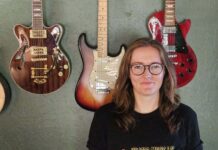‘Truth and integrity are important in the creation of art’

Idyllwild Arts Academy Visual Arts Chair David Reid-Marr is the next speaker at the Spotlight on Leadership series at the academy.
The series, part of the academy’s outreach to the community, and its desire to build bridges of understanding and communication between campus and community, is sponsored by the Associates of the Idyllwild Arts Foundation. The series focuses on IAA educators, programs and calendars of performance and presentation.
Reid-Marr has taught at the academy for 18 years. Native of Kent, England, he received a Master of Fine Arts degree from the Royal College of Art in London and came to the U.S. to study Zen Buddhism with Zen Master Maezumi Roshi, who founded centers in Los Angeles and in Mountain Center.
Reid-Marr said he’d talk about the Visual Arts Department, its students and the way in which art is taught at the academy. “We, both faculty and students, come from all kinds of backgrounds and from all over the world,” said Reid-Marr. “That diversity informs and creates the way in which we teach. This is a dynamic environment that is very responsive to social change and cultural shifts. One of the strengths of the Visual Arts Department is how eclectic and diverse the faculty is, which allows the cultural diversity and sensibilities of our students to emerge through their work.”
Reid-Marr said that as department chairman, he is encouraging students to be more experimental with their work and to integrate more social awareness. “We, as faculty, need to model what it is to be collaborative with the goal of creating more citizen artists who are involved with and making contributions to society,” he stressed.
“Something here at the academy that is so refreshing is the current social climate. Truth and integrity are important in the creation of art, especially now in a world where we don’t know what the truth is.”
Reid-Marr noted that creating art is hard work. “Yes, there is inspiration, but for the most part it involves very hard work,” he said. “I stress to students that the studio is sacred space where transformation happens. My strategy with them is to create an environment of mutual support. I tell them, ‘You are creating objects that have never been made before. Do you realize how special that is?’
“We do these all-night ‘paintathons,’ outside of regular classes. Students volunteer and sign up to work together in this more relaxed social environment and learn how to collaborate.”
Reid-Marr said the challenge and joy in teaching students from so many different backgrounds is to break down emotional, cultural, personal and formal barriers so students can grow and find their own way as young artists. “They’re allowed to make mistakes, as am I,” said Reid-Marr. That’s where the energy is. It’s so important to have the freedom to do so.
“From an early age, we have this notion that we must stick to one thing. But so much of art is about the things that unfold, with implications you might not intend. With art, it is natural to follow the lead that comes from the work itself — not your thinking about the work.”
Reid-Marr said the most challenging and rewarding part of the year is when seniors have to defend their shows. “That dialogue, presenting themselves to the world in front of the department, is so important, especially now in a time of [political and social] proclamations with no opportunity for rebuttal, engagement or robust conversation,” he said.
Reid-Marr speaks and illustrates from his department’s students’ work beginning at 10 a.m. Monday, March 13, at the Fireside Room, Nelson Dining Hall, on the IAA campus. The presentation is free to the public.










